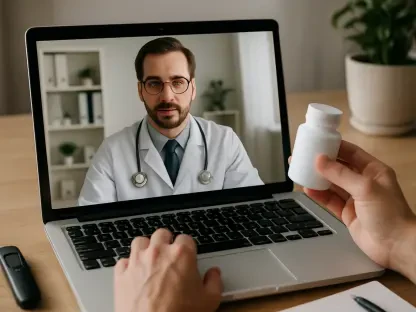In an era where healthcare systems grapple with rising costs and the ever-pressing need to improve patient outcomes, one network stands out for its innovative approach to pharmacy operations. Baptist Health, a 10-hospital system primarily serving Kentucky and southern Indiana, has embarked on a transformative journey to streamline medication management across its hospitals, outpatient pharmacies, and clinics. By leveraging cutting-edge technology and rethinking traditional workflows, this healthcare giant is addressing long-standing challenges like inventory inefficiencies and medication access. The result is a model that not only cuts costs but also ensures that patients receive the right medications at the right time, while allowing pharmacy staff to focus on what truly matters—patient care. This initiative offers a glimpse into how strategic investments in infrastructure and automation can redefine operational success in healthcare.
Centralizing Operations for Greater Impact
Building a Unified Pharmacy Hub
A cornerstone of Baptist Health’s strategy lies in the establishment of the Central Pharmacy Services Center (CPSC) in La Grange, Kentucky, a facility that recently began operations to serve as the nerve center for the entire network. Spanning an impressive 102,000 square feet, this hub consolidates procurement and administrative tasks that were once managed separately at each hospital and clinic. The shift to a centralized model tackles the spatial constraints often encountered within hospital walls, enabling efficient storage and distribution of medications. By negotiating directly with manufacturers, the CPSC secures better pricing and mitigates the risk of drug shortages through proactive inventory planning. This approach minimizes waste and ensures a steady supply of critical medications across all locations, creating a seamless flow that benefits both staff and patients. The impact is clear: a more robust system that prioritizes consistency and reliability in medication availability.
Streamlining Staff Roles and Responsibilities
Beyond infrastructure, the centralization effort at Baptist Health is redefining how pharmacy staff operate within the network. With administrative burdens like procurement and inventory tracking now handled by the CPSC, local pharmacists are freed to focus on direct patient interactions. This shift, as highlighted by key leaders within the system, is not about reducing roles but about elevating the role of pharmacists to operate at the peak of their professional expertise. Instead of spending hours on logistical tasks, they can now dedicate time to counseling patients, managing complex medication regimens, and collaborating with other healthcare providers. The result is a workforce that feels empowered to make a tangible difference in patient outcomes. This strategic reallocation of responsibilities underscores a broader vision of balancing operational efficiency with the human element of care, ensuring that technology serves as a tool to enhance, not replace, personal engagement.
Harnessing Technology for Precision and Safety
Automating Inventory with Advanced Software
At the heart of Baptist Health’s efficiency drive is the adoption of sophisticated technology, notably Omnicell’s MedVision software, which offers real-time inventory monitoring across the network. This tool alerts the CPSC staff when stock levels at any location dip below predefined thresholds, triggering timely replenishments. The software’s integration with automatic dispensing cabinets (ADCs) has pushed automation to new heights, with over half of ADC replenishments now fully automated. This reduces the likelihood of human error, a persistent challenge in manual inventory systems, and ensures that medications are always available where and when they are needed. By creating a responsive and data-driven inventory system, Baptist Health is moving closer to an autonomous pharmacy model, setting a benchmark for how technology can transform traditional healthcare operations into a more precise and reliable framework.
Enhancing Patient Safety Through Error Reduction
The push toward automation at Baptist Health extends beyond mere efficiency—it directly impacts patient safety by minimizing medication errors. Automated systems like ADCs, supported by real-time software alerts, eliminate many of the manual steps that often lead to mistakes, such as incorrect dosing or delayed restocking. This technological backbone allows for a level of accuracy that manual processes struggle to match, ensuring that patients receive the correct medications without unnecessary delays. Moreover, the data generated by these systems provides valuable insights into usage patterns, helping to predict and prevent potential shortages before they become critical. This proactive approach not only safeguards patient health but also builds trust in the system’s ability to deliver consistent care. Baptist Health’s commitment to integrating such technologies reflects a deep understanding of the interplay between operational precision and clinical excellence, paving the way for safer healthcare delivery.
Looking Ahead: A Model for the Future
Reflecting on Transformative Steps Taken
Looking back, Baptist Health took bold steps by launching the Central Pharmacy Services Center and integrating advanced tools like MedVision software to overhaul pharmacy operations. These efforts tackled inefficiencies head-on, from fragmented inventory management to overburdened staff, and delivered measurable improvements in cost control and medication access. The automation of over half of the dispensing processes marked a significant milestone in reducing errors, while the centralization of procurement freed up pharmacists to prioritize patient care. Each decision reflected a thoughtful balance between leveraging technology and preserving the essential human touch in healthcare. The journey demonstrated that systemic change, when executed with precision, could yield benefits that ripple across an entire network, enhancing both operational and clinical outcomes.
Charting the Path Forward with Innovation
As Baptist Health continues to refine its pharmacy model, the focus shifts to scaling these innovations and sharing insights with other healthcare systems facing similar challenges. Exploring further advancements in automation, such as predictive analytics for inventory needs, could enhance preparedness for demand spikes. Additionally, fostering collaborations with technology partners might unlock new tools to refine efficiency even further. For other networks, adopting a centralized approach or investing in real-time monitoring systems could serve as a starting point to address inefficiencies. The key lies in tailoring solutions to specific regional and operational needs while maintaining a patient-first mindset. Baptist Health’s experience offers a compelling blueprint, suggesting that the future of pharmacy operations hinges on blending strategic infrastructure investments with cutting-edge technology to create resilient, responsive healthcare systems.









